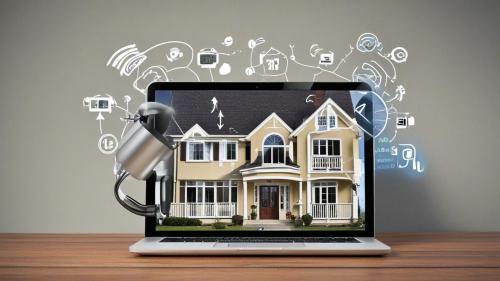In the modern age, where technology infiltrates every nook and cranny of our daily lives, it's no surprise that smart homes have become the new frontier for convenience and, unfortunately, vulnerability. With an increasing number of devices connected to the internet, smart homes are both intriguing and alarming. But herein lies the question: just how safe is your smart home?
Imagine waking up one sunny morning, the aroma of coffee filling your smart kitchen, thanks to an automated brew set to start at the crack of dawn. The curtains draw apart to reveal the day, precisely when you plan to begin your morning routine. It's all orchestrated perfectly, like living in a personal utopia. However, beneath the surface of blissful efficiency lurks a sinister potential—cybersecurity gaps that could render your seemingly secure haven into a hacker’s playground.
Cybersecurity experts wave red flags over the increasing number of breaches in smart home devices. Take, for instance, your intelligent thermostat, which, while making sure your home remains cozy, could be a gateway for cyber intruders. The thermostat, along with other smart gadgets like speakers, cameras, and lights, can act as entry points if not secured diligently. It becomes imperative for smart home owners to think critically about which devices genuinely enhance their security.
Manufacturers play a pivotal role in this security tango, with their responsibility only increasing as technology progresses. It’s their job to ensure that security updates are rolled out frequently. Users, on the other hand, must be vigilant and timely in applying these updates, yet statistics reveal that a significant percentage of users overlook these critical updates, often due to a lack of awareness or due to the inconvenience they pose.
Let's not forget the mindset around passwords. The common practice of using '123456' or 'password' as a fortress against cyber-attacks is as effective as putting up a 'do not disturb' sign to keep burglars away. This alarming trend begs the conversation on why stronger, more complex passwords are non-negotiable. Coupled with two-factor authentication—a simple step that can significantly bolster security against unauthorized access—users can make their digital fortress that much harder to breach.
The rapid evolution in smart home technology paves the way for delightful innovations but flags privacy as a growing concern. As personal data gets generated and stored in the cloud, questions arise about user privacy. Who has access to your data? Are manufacturers keen to protect your privacy or capitalize on it? Awareness and understanding of privacy settings are essential, perhaps more than they have ever been. Users must read the fine print carefully and exercise control over what their smart devices can access and record.
Digging into the physical security aspect, the introduction of smart locks has revamped the definition of 'unlocking the door.' What once required a physical device—a key—can now be controlled remotely via a smartphone. While this is undeniably convenient, what happens if a hacker gains access to that digital key? The verdict for many still swings between embracing the future and clinging to traditional keys. Forensic analysis of different breaches reveals a striking pattern: many smart-home victims had their devices on default settings, highlighting a simple yet crucial security lapse—always change default configurations.
As the discourse surrounding smart home safety intensifies, it’s interesting to observe how the human element interacts with technology. People tend to drop their guard around devices they perceive as innocuous. The small, unassuming speaker in the corner of your living room could very well be listening to more than your favorite songs. So should we stop using smart devices altogether? That’s not the solution; instead, by approaching smart home living with informed caution and a robust security-first mindset, we can enjoy the best of both worlds.
The future is undeniably exciting for techno-enthusiasts, with AI-driven enhancements making smart homes even more intuitive. However, as users, taking proactive measures to secure these environments is crucial. The digital age is nothing if not a balancing act, poised between advancement and responsibility, where the choices we make can profoundly influence tomorrow’s security landscape.
How safe is your smart home? Navigating the new age of home security




